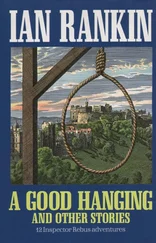The priest carefully turned his hat on his knees. He had a little trick of waiting a second silently and then swinging the conversation back into his own paths. He was about eighty. She had never known a priest until she had gone to see this one on the business of getting her the Displaced Person. After he had got her the Pole, he had used the business introduction to try to convert her—just as she had supposed he would.
“Give him time,” the old man said. “He’ll learn to fit in. Where is that beautiful birrrrd of yours?” he asked and then said, “Arrrrr, I see him!” and stood up and looked out over the lawn where the peacock and the two hens were stepping at a strained attention, their long necks ruffled, the cock’s violent blue and the hens’ silver-green, glinting in the late afternoon sun.
“Mr. Guizac,” Mrs. McIntyre continued, bearing down with a flat steady voice, “is very efficient. I’ll admit that. But he doesn’t understand how to get on with my niggers and they don’t like him. I can’t have my niggers run off. And I don’t like his attitude. He’s not in the least grateful for being here.”
The priest had his hand on the screen door and he opened it, ready to make his escape. “Arrrr, I must be off,” he murmured.
“I tell you if I had a white man who understood the Negroes, I’d have to let Mr. Guizac go,” she said and stood up again.
He turned then and looked her in the face. “He has nowhere to go,” he said. Then he said, “Dear lady, I know you well enough to know you wouldn’t turn him out for a trifle!” and without waiting for an answer, he raised his hand and gave her his blessing in a rumbling voice.
She smiled angrily and said, “I didn’t create his situation, of course.”
The priest let his eyes wander toward the birds. They had reached the middle of the lawn. The cock stopped suddenly and curving his neck backwards, he raised his tail and spread it with a shimmering timbrous noise. Tiers of small pregnant suns floated in a green-gold haze over his head. The priest stood transfixed, his jaw slack Mrs. McIntyre wondered where she had ever seen such an idiotic old man. “Christ will come like that!” he said in a loud gay voice and wiped his hand over his mouth and stood there, gaping.
Mrs. McIntyre’s face assumed a set puritanical expression and she reddened. Christ in the conversation embarrassed her the way sex had her mother. “It is not my responsibility that Mr. Guizac has nowhere to go,” she said. “I don’t find myself responsible for all the extra people in the world.”
The old man didn’t seem to hear her. His attention was fixed on the cock who was taking minute steps backward, his head against the spread tail. “The Transfiguration,” he murmured.
She had no idea what he was talking about. “Mr. Guizac didn’t have to come here in the first place,” she said, giving him a hard look.
The cock lowered his tail and began to pick grass.
“He didn’t have to come in the first place,” she repeated, emphasizing each word.
The old man smiled absently. “He came to redeem us,” he said and blandly reached for her hand and shook it and said he must go.
If Mr. Shortley had not returned a few weeks later, she would have gone out looking for a new man to hire. She had not wanted him back but when she saw the familiar black automobile drive up the road and stop by the side of the house, she had the feeling that she was the one returning, after a long miserable trip, to her own place. She realized all at once that it was Mrs. Shortley she had been missing. She had had no one to talk to since Mrs. Shortley left, and she ran to the door, expecting to see her heaving herself up the steps.
Mr. Shortley stood there alone. He had on a black felt hat and a shirt with red and blue palm trees designed in it but the hollows in his long bitten blistered face were deeper than they had been a month ago.
“Well!” she said. “Where is Mrs. Shortley?”
Mr. Shortley didn’t say anything. The change in his face seemed to have come from the inside; he looked like a man who had gone for a long time without water. “She was God’s own angel,” he said in a loud voice. “She was the sweetest woman in the world.”
“Where is she?” Mrs. McIntyre murmured.
“Daid,” he said. “She had herself a stroke on the day she left out of here.” There was a corpse-like composure about his face “I figure that Pole killed her,” he said. “She seen through him from the first. She known he come from the devil. She told me so.”
It took Mrs. McIntyre three days to get over Mrs. Shortley’s death. She told herself that anyone would have thought they were kin. She rehired Mr. Shortley to do farm work though actually she didn’t want him without his wife. She told him she was going to give thirty days’ notice to the Displaced Person at the end of the month and that then he could have his job back in the dairy. Mr. Shortley preferred the dairy job but he was willing to wait. He said it would give him some satisfaction to see the Pole leave the place, and Mrs. McIntyre said it would give her a great deal of satisfaction. She confessed that she should have been content with the help she had in the first place and not have been reaching into other parts of the world for it. Mr. Shortley said he never had cared for foreigners since he had been in the first world’s war and seen what they were like. He said he had seen all kinds then but that none of them were like us. He said he recalled the face of one man who had thrown a hand-grenade at him and that the man had had little round eye-glasses exactly like Mr. Guizac’s.
“But Mr. Guizac is a Pole, he’s not a German,” Mrs. McIntyre said.
“It ain’t a great deal of difference in them two kinds,” Mr. Shortley had explained.
The Negroes were pleased to see Mr. Shortley back. The Displaced Person had expected them to work as hard as he worked himself, whereas Mr. Shortley recognized their limitations. He had never been a very good worker himself with Mrs. Shortley to keep him in line, but without her, he was even more forgetful and slow. The Pole worked as fiercely as ever and seemed to have no inkling that he was about to be fired. Mrs. McIntyre saw jobs done in a short time that she had thought would never get done at all. Still she was resolved to get rid of him. The sight of his small stiff figure moving quickly here and there had come to be the most irritating sight on the place for her, and she felt she had been tricked by the old priest. He had said there was no legal obligation for her to keep the Displaced Person if he was not satisfactory, but then he had brought up the moral one.
She meant to tell him that her moral obligation was to her own people, to Mr. Shortley, who had fought in the world war for his country and not to Mr. Guizac who had merely arrived here to take advantage of whatever he could. She felt she must have this out with the priest before she fired the Displaced Person. When the first of the month came and the priest hadn’t called, she put off giving the Pole notice for a little longer.
Mr. Shortley told himself that he should have known all along that no woman was going to do what she said she was when she said she was. He didn’t know how long he could afford to put up with her shilly-shallying. He thought himself that she was going soft and was afraid to turn the Pole out for fear he would have a hard time getting another place. He could tell her the truth about this: that if she let him go, in three years he would own his own house and have a television aerial sitting on top of it. As a matter of policy, Mr. Shortley began to come to her back door every evening to put certain facts before her. “A white man sometimes don’t get the consideration a nigger gets,” he said, “but that don’t matter because he’s still white, but sometimes,” and here he would pause and look off into the distance, “a man that’s fought and bled and died in the service of his native land don’t get the consideration of one of them like them he was fighting. I ast you: is that right?” When he asked her such questions he could watch her face and tell he was making an impression. She didn’t look too well these days. He noticed lines around her eyes that hadn’t been there when he and Mrs. Shortley had been the only white help on the place. Whenever he thought of Mrs. Shortley, he felt his heart go down like an old bucket into a dry well.
Читать дальше









